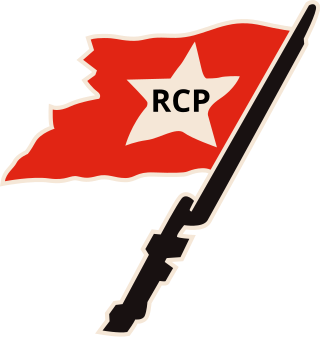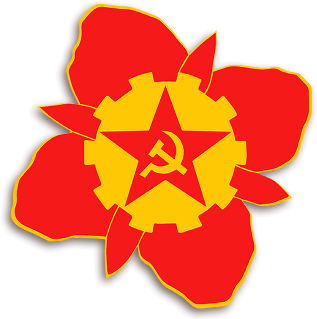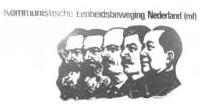A communist party is a political party that seeks to realize the socio-economic goals of communism. The term "communist party" was popularized by the title of The Manifesto of the Communist Party (1848) by Karl Marx and Friedrich Engels. As a vanguard party, the communist party guides the political education and development of the working class (proletariat). As a ruling party, the communist party exercises power through the dictatorship of the proletariat. Vladimir Lenin developed the idea of the communist party as the revolutionary vanguard, when the socialist movement in Imperial Russia was divided into ideologically opposed factions, the Bolshevik faction and the Menshevik faction. To be politically effective, Lenin proposed a small vanguard party managed with democratic centralism which allowed the centralized command of a disciplined cadre of professional revolutionaries. Once a policy was agreed upon, realizing political goals required every Bolshevik's total commitment to the agreed-upon policy.
Maoism, officially Mao Zedong Thought, is a variety of Marxism–Leninism that Mao Zedong developed while trying to realize a socialist revolution in the agricultural, pre-industrial society of the Republic of China and later the People's Republic of China. A difference between Maoism and traditional Marxism–Leninism is that a united front of progressive forces in class society would lead the revolutionary vanguard in pre-industrial societies rather than communist revolutionaries alone. This theory, in which revolutionary praxis is primary and ideological orthodoxy is secondary, represents urban Marxism–Leninism adapted to pre-industrial China. Later theoreticians expanded on the idea that Mao had adapted Marxism–Leninism to Chinese conditions, arguing that he had in fact updated it fundamentally and that Maoism could be applied universally throughout the world. This ideology is often referred to as Marxism–Leninism–Maoism to distinguish it from the original ideas of Mao.

The Revolutionary Socialist League (RSL) was a Trotskyist group in the United States established in 1973 and disbanded in 1989.

The Freedom Road Socialist Organization (FRSO) is a communist organization political party in the United States. FRSO formed in 1985 as a merger of several Maoist-oriented New Communist movement organizations.
The Revolutionary Communist Youth Brigade (RCYB) was the former youth group of the Revolutionary Communist Party, USA.
The New Communist movement (NCM) was a diverse left-wing political movement during the 1970s and 1980s in the United States. The NCM were a movement of the New Left that represented a diverse grouping of Marxist–Leninists and Maoists inspired by Cuban, Chinese, and Vietnamese revolutions. This movement emphasized opposition to racism and sexism, solidarity with oppressed peoples of the third-world, and the establishment of socialism by popular revolution. The movement, according to historian and NCM activist Max Elbaum, had an estimated 10,000 cadre members at its peak influence.

The League of Revolutionary Struggle (Marxist–Leninist) was a Marxist–Leninist[1] movement in the United States formed in 1978 by merging communist organizations. It was dissolved by the organization's leadership in 1990.
The Communist Labor Party of the United States of North America (CLP or CLP(USNA)) was an anti-revisionist communist party that was part of the New Communist movement in the United States.
The Democratic Workers Party was a United States Marxist–Leninist party based in California headed by former professor Marlene Dixon, lasting from 1974–1987. One member, Janja Lalich, later became a widely cited researcher on cults. Lalich characterized the DWP as a political cult with Dixon serving as its charismatic leader. She estimated that the Democratic Workers Party at one point had 125-150 full-time members and 300-1,000 members with various degrees of affiliation.

The Workers' Socialist Movement is a Puerto Rican democratic socialist revolutionary organization, formed in 1982 and dedicated to the self-organization and self-emancipation of the working-class in Puerto Rico, as well as international solidarity with the workers struggles worldwide. It is usually known as the "MST", and its youth section is the Unión de Juventudes Socialistas, also known as the "UJS-MST" or simply "UJS". The MST supports a socialist and independent Puerto Rico.

The Spartacist League/U.S. is a Trotskyist political grouping which is the United States section of the International Communist League, formerly the International Spartacist Tendency. This Spartacist League named themselves after the original Spartacus League of Weimar Republic in Germany, but has no formal descent from it. The League self-identifies as a "revolutionary communist" organization.

The Revolutionary Communist Party, USA is a new communist party in the United States founded in 1975 and led by its chairman, Bob Avakian. The party organizes for a revolution to overthrow the system of capitalism and replace it with a socialist state, with the final aim of world communism. The RCP is frequently described as a cult around Avakian.

The Revolutionary Communist Party of Britain (Marxist–Leninist) (RCPB-ML) and occasionally referred to as RCP is a small British communist political party, previously named the Communist Party of England (Marxist-Leninist) on formation in 1972 until being reorganised in 1979 after rejecting Maoism and aligning with Albania. The party's thinking is based on the politics of Hardial Bains, who travelled the world founding orthodox (anti-revisionist) communist parties.

The Communist Party of Canada (Marxist–Leninist) is a federal political party in Canada. It was founded in 1970 by Hardial Bains, a staunch Stalinist and anti-revisionist. The CPC (M-L) has been registered with Elections Canada as the Marxist–Leninist Party of Canada (MLPC) since 1974, as the party is prohibited from using the name "Communist Party of Canada" in Canadian elections to avoid confusion among voters. The party is not an offshoot of the Communist Party of Canada; its early membership came from student-led organizations active in the 1960s. After a period of alignment with Maoism and China, the CPC (M-L) pursued a Hoxhaist, pro-Albanian line until the early 1990s. At present, the party directs most of its public support to Cuba and North Korea.

Communist Unity Movement of the Netherlands (marxist-leninist) (Dutch: Kommunistiese Eenheidsbeweging Nederland (marxisties-leninisties); KEN (ml)) was a communist organization in the Netherlands founded in 1964.

Marxism–Leninism–Maoism (MLM), also known as Marxism–Leninism–Mao Zedong Thought, is a political philosophy that synthesizes and builds upon Marxism–Leninism and Mao Zedong Thought. Marxism–Leninism–Maoism was first formalized by the Shining Path in 1982.







